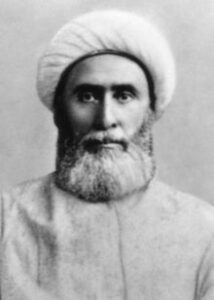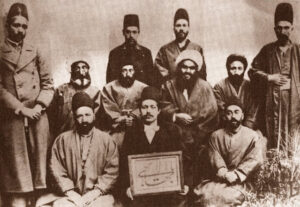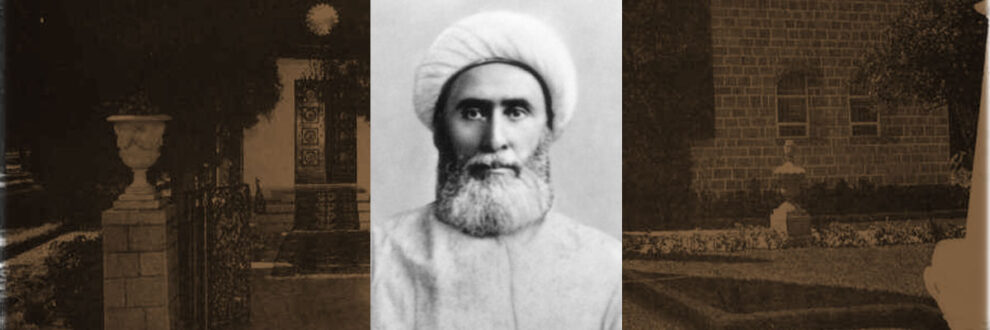 Aqa Mirza Muhammad-Taqi Abhari (Ibn-i-Abhar)
Aqa Mirza Muhammad-Taqi Abhari (Ibn-i-Abhar)
Born: 1853/1854
Death: 1917
Place of Birth: Unknown
Location of Death: Unknown
Burial Location: No cemetery details
During the last few years of His life Bahá’u’lláh chose four of His devoted followers and designated them as Hands of the Cause of God. They were Haji Mulla ‘Ali-Akbar-i-Shahmirzadi, known as Haji Akhund; Mirza Muhammad-Taqi, known as Ibn-i-Abhar; Mirza ‘Ali-Muhammad, known as Ibn-i- Asdaq, and Haji Mirza Hasan, surnamed Adib. These appointments, so far as we know, did not take place at one time. Also, they did not take the form of announcing their names to the community or outlining their functions in one special Tablet. With the exception of Mirza Hasan-i-Adib, who embraced the Faith about three years before the ascension of Bahá’u’lláh, the other three Hands of the Cause were long-standing believers. They were the recipients of many Tablets in which, over the years, He showered upon them His blessings, guided their steps, praised their work and exalted their station in glowing terms. In these Tablets He often refers to them as ‘the Chosen Ones’, ‘the loved ones’, ‘the detached souls’, ‘the pure in spirit’ and similar designations.
It is reported that Aqa Mirza Muhammad-Taqi Abhari (Ibn-i-Abhar) to have received many tablets from Bahá’u’lláh. Two are known and listed as Lawh-e Ibn-e Abhar.[1]
Lawh-e Ibn-e Abhar I (First tablet to Ibn-e Abhar)
[Ma`iydih-e Asmani vol. 9 96. Partially translated in the Compilation on Trustworthiness 14 no. 48.]
Lawh-e Ibn-e Abhar II (Second Tablet to Ibn-e Abhar)
[Ma`iydih-e Asmani vol. 9 106-7. Partially translated in the Compilation on Trustworthiness 13 no. 47. Addressee is Mirza Muhammad Taqi, Ibn-e Abhar.[2]
During His lifetime Bahá’u’lláh directed the Hands to consult among themselves and with other believers on issues which were vital for the growth and development of the Bahá’í community. For example, Ibn-i-Abhar had posed the question of the well-being and prosperity of the Bahá’ís of Persia. In a Tablet revealed in 1889 Bahá’u’lláh in response states that one should adhere to any means which may become the cause of the exaltation of the Word of God, the elevation of the minds and souls, the upliftment of the station of man, and the achievement of those things which benefit humanity. He then asserts that the answer will come through consultation. He urges Ibn-i-Abhar and the other Hands to gather together and invite a few devoted souls who have attained the station of certitude in the Faith and are observing the teachings, to join them in consultation about the various affairs. The next step, Bahá’u’lláh advises, would be to rely on God’s confirmations and carry out the decision reached. He assures them that if they do this, they will be inspired by Him to achieve that which is the cause of prosperity and salvation.
It seems that at a certain point in His Ministry Bahá’u’lláh, wishing to emphasize the importance of consultation in resolving various issues, sometimes deliberately declined to give guidance when asked for advice and instead urged the questioner to seek consultation on the subject. For instance, Ibn-i-Abhar once sought guidance from Bahá’u’lláh as to where he should reside in Persia. The answer was that first he ought to seek consultation with some souls who were well-assured and steadfast in the Faith, and then implement their decision.[3]
In another Tablet to Jinab-i-ibn-i-Abhar, one of the Hands of the Cause of God, ‘Abdu’l-Baha states that in their dealings with each other, the believers must uphold the highest standard of honesty and trustworthiness:
You have written on the question of how the friends should proceed in their business dealings with one another. This is a question of the greatest importance and a matter that deserveth the liveliest concern. In relations of this kind, the friends of God should act with the utmost trustworthiness and integrity. To be remiss in this area would be to turn one’s face away from the counsels of the Blessed Beauty and the holy precepts of God. If a man in his own home doth not treat his relations and friends with entire trustworthiness and integrity, his dealings with the outside world — no matter how much trustworthiness and honesty he may bring to them — will prove barren and unproductive. First one should order one’s own domestic affairs, then attend to one’s business with the public. One should certainly not argue that the friends need not be treated with undue care, or that it is unnecessary for them to attach too great importance to the practice of trustworthiness in their dealings with one another, but that it is in their relations with strangers that correct behavior is essential. Talk like this is sheer fantasy and will lead to detriment and loss. Blessed be the soul that shineth with the light of trustworthiness among the people and becometh a sign of perfection amidst all men.
 ‘Abdu’l-Baha despatched Jinab-i-Ibn-i-Abhar, to Yazd with a special mission. Some large gatherings were held and Ibn-i-Abhar aroused the believers to great heights of spirituality and particularly prepared them for martyrdom should the occasion arise. Consequently a great many souls stood ready to sacrifice their lives in the path of God. This was the summer of 1903, a few months after the arrival of Ustad ‘Ali-Akbar. Ibn-i-Abhar left Yazd; he had hardly reached a neighboring town when suddenly a great uprising against the Bahá’ís erupted in the city, which soon spread to several villages around Yazd. This was the greatest upheaval that had occurred in Persia during the Ministries of Bahá’u’lláh and ‘Abdu’l-Baha since the blood-bath of Tihran after the attempt on the life of Nasiri’d-Din Shah in 1852. [4]
‘Abdu’l-Baha despatched Jinab-i-Ibn-i-Abhar, to Yazd with a special mission. Some large gatherings were held and Ibn-i-Abhar aroused the believers to great heights of spirituality and particularly prepared them for martyrdom should the occasion arise. Consequently a great many souls stood ready to sacrifice their lives in the path of God. This was the summer of 1903, a few months after the arrival of Ustad ‘Ali-Akbar. Ibn-i-Abhar left Yazd; he had hardly reached a neighboring town when suddenly a great uprising against the Bahá’ís erupted in the city, which soon spread to several villages around Yazd. This was the greatest upheaval that had occurred in Persia during the Ministries of Bahá’u’lláh and ‘Abdu’l-Baha since the blood-bath of Tihran after the attempt on the life of Nasiri’d-Din Shah in 1852. [4]
In one place in Bahá’u’lláh’s Writings He states that Hájí Mírzá Muhammad-Taqíy-i- Abharí ws created to extol the praises and attributes of God. His services during the time of the Master included teaching journeys through Persia, the Caucasus and India. He also made some eleven journeys to the Holy Land with the permission of ‘Abdu’l-Bahá. “A special service rendered by Ibn-i-Abhar was the promotion of the education of women. He and his wife played an important part in the advancement of women in Persian society.” He died in 1917.[5]
Source:
1 Taherzadeh, Adib. The Revelation of Bahá’u’lláh. London: Bahá’í Publishing Trust, 1972. v.4 p. 290
2 Qur’an, p. 112
3 Taherzadeh, Adib. The Revelation of Bahá’u’lláh. London: Bahá’í Publishing Trust, 1972. v.3 pp. 313-315
4 Taherzadeh, Adib. The Revelation of Bahá’u’lláh. London: Bahá’í Publishing Trust, 1972. v.4 pp. 304-12
5 “Hands of the Cause of God” Bahai-Library: Winters, Jonah
Images:
The Revelation of Bahá’u’lláh, Volume 4, Chapter 19: www.peyman.info
The Revelation of Bahá’u’lláh, Volume 4, Chapter 20: www.peyman.info




